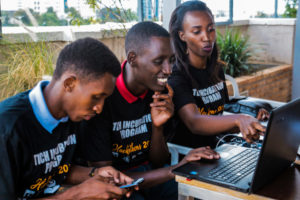Frankfurt School (FS) is implementing the Technology Incubation Program – a gendered approach (#TechIncubationProg) in Rwanda and Sudan. This program is a collaboration between the African Development Bank (AfDB) and the Korean-Africa Economic Cooperation. The purpose is to foster entrepreneurship and move the innovation agenda forward by strengthening the entrepreneur’s chances of success through incubation support and mentorship. In order to identify young innovators that will receive business incubation, FS organized a sequence of hackathons. Within a space of 16 hours, competing teams comprising young aspiring tech entrepreneurs were challenged to develop from scratch – a working prototype.
Hackathon Solutions
The solutions proposed by the competing teams took the judges by surprise. One of the hackathon judges noted that: The hackathons have brought to light the huge potential among the youth in Rwanda. There is certainly no shortage of talent and good ideas among our youth.
The solutions proposed by the teams ranged from software to IoT based hardware. One of the innovations that caught the attention of judges is the Smart tomato store which significantly extends the shelf life of tomatoes by digitally controlling all parameters that could cause them to deteriorate quickly. Others include a solar powered drying system that uses thermal transfer technology to dry harvested maize in a weather proof environment.
Lessons Learned
Below are some of the lessons learned from the implementation of the hackathons in Rwanda:
- The “what next” question for many hackathon contenders remains unanswered: The ICT centric innovation ecosystem in Rwanda is awash with hackathons targeting innovators organized under different programs. Many promising ideas emerge out of the hackathons, which are far more than what the current programs can accommodate in their incubation programs. Moreover, few innovation support networks provide acceleration programs after incubation. In addition for better coordination within the innovation ecosystem, it is important to think about how to nurture and groom the so many young innovators who may not make it to the existing incubation programs.
- Hackathons provide a learning opportunity for the participants: In a hackathon, the winner doesn’t take it all. The competitors interviewed said that even if they were not selected as winners, the opportunity to participate in the hackathon was already impactful.
- Important networks are built during the hackathons: The hackathon participants had the opportunity to interact with a cross section of stakeholders in Rwanda including government officials, industry leaders from the private sector drawn from the different competition domains, donors among others. The hackers were able to hear firsthand from the experts and were also able to share contacts which could be useful in the subsequent phases of their entrepreneurial journey.
- Although the program aims to have a relatively higher female participation rate, this aspiration is not yet tenable: During the call for applications, female candidates were strongly encouraged to apply. Despite this clear bias towards female applicants, the team composition in the majority of cases had more male applicants. This is reflective of the reality on the ground that ICT is still largely male-dominated. In cases where female innovators seemed to be in the lead, they still needed their male counterparts to play an active role in their team.

Conclusion
Overall, the implementation of the hackathons in Rwanda was very successful. The main success factors include clear and active communication with the hackathon contenders, selection of an appropriate venue, identification of good and experienced hackathon mentors and judges who are passionate about innovation and developing young talents in ICT.
